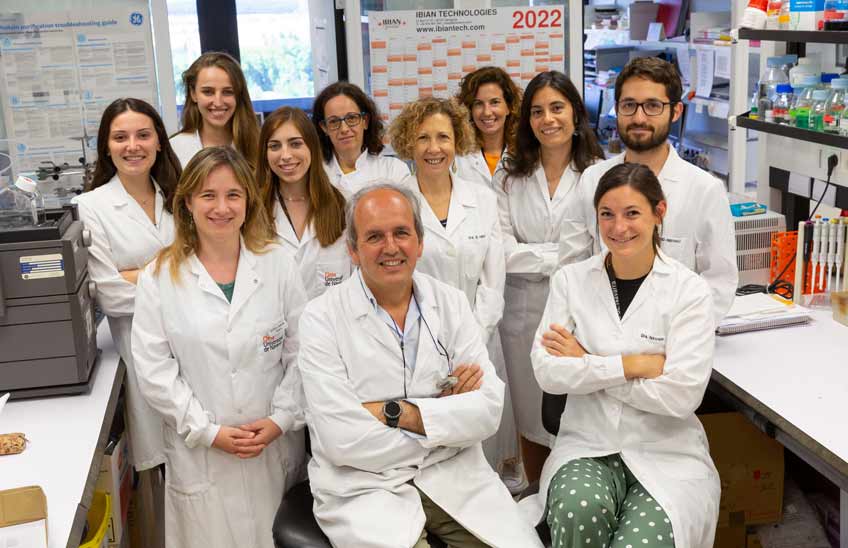Immune cells 'boosted' to fight cancer
Researchers at Cima and Clínica Universidad de Navarra succeed in genetically modifying T-lymphocytes so that they adapt to the tumour microenvironment and improve their anti-tumour activity.

14 | 06 | 2022
Researchers from the Cima and Clínica Universidad de Navarra researchers have succeeded in enhancing the function of the cells responsible for killing tumours, the subject T lymphocytes. By modifying Genetics, they have obtained cells capable of adapting to the tumour's adverse microenvironment and improving their proliferative and anti-tumour activity. With this cell therapy strategy, they have managed to delay the growth of the disease and increase survival in mice with melanoma and hepatocarcinoma.
The results of this study have been published in the latest issue of the scientific journal Oncoimmunology.
Complexity of the tumour environment
The tumour microenvironment is a complex and changing environment in which malignant cells coexist with immune cells. It is characterised by an acidic environment, with a very low pH. "When leave the pH, the lymphocytes become acidic and 'switch off', they are not able to perform their function. Then, we noticed that some tumour cells do survive in this environment because they express proteins that allow them to modulate their intracellular pH, giving them an advantage over lymphocytes," says Juan José Lasarte, director of the Immunology and Immunotherapy Programme at Cima. "Analysing this concept, we looked for a way to modulate the pH of lymphocytes so that they do not become acidified and thus increase their proliferative capacity," adds Lasarte.
New strategy to improve current immunotherapy
Adoptive cell therapy is an immunotherapy subject based on administering T-cells to the patient to help them fight their disease. It is a personalised medicine therapy, as T-cells are taken from the patient, multiplied on laboratory and re-infused into the patient. Sometimes these cells are modified at laboratory to improve their ability to recognise and destroy the tumour, as in the case of CAR-T cells. Another adoptive cell therapy is therapy with tumour infiltrating lymphocytes, immune cells naturally found in the patient's tumour.
Experimental therapies are currently being tested to try to neutralise the acidic pH of the tumour, but these treatments affect the whole body and are not very effective. "In our research we are looking for a more targeted alternative and we focus on improving the immune cells so that they can survive in the acidic tumour environment," says Lasarte.
Specifically, says Flor Navarro, researcher at Cima and first author of the study: "at laboratory we genetically modify T lymphocytes by adding 'transporters' to their membrane that enable them to expel from their interior the protons that infiltrate from the tumour environment and cause its acidification. With this modification, we managed to ensure that the lymphocyte does not 'switch off' in this adverse acidic environment and can exert its anti-tumour activity.
The work has been carried out at programs of study in-vitro and in-vivo in mice with melanoma and hepatocarcinoma. Using various immunotherapy strategies, they have managed to "significantly delay tumour growth and increase tumour survival," says Navarro. "Clinical trials are currently underway with CAR-T for the treatment of hepatocarcinoma. With our research we have proven that we could boost this CAR-T therapy available with our 'transporter'. Thus, the results of this work suggest that overcoming the 'barrier' of the acidity of the pH of the tumour environment with T-lymphocytes modified with the 'transporter' could enhance the effectiveness of existing combined immunotherapies," says the researcher.
The work is part of the high school of high school of research Sanitary of Navarra. It has received funding from the Government of Navarra (project DESCARTHeS), from the Ministries of Education and Science (Project AutoCAR), Science and Innovation (project CARPanTu) and from the Next Generation and Horizon 2020 grants of the European Union. It has also received support from the Ramón Areces Foundation and the Paula & Rodger Riney Foundation.
